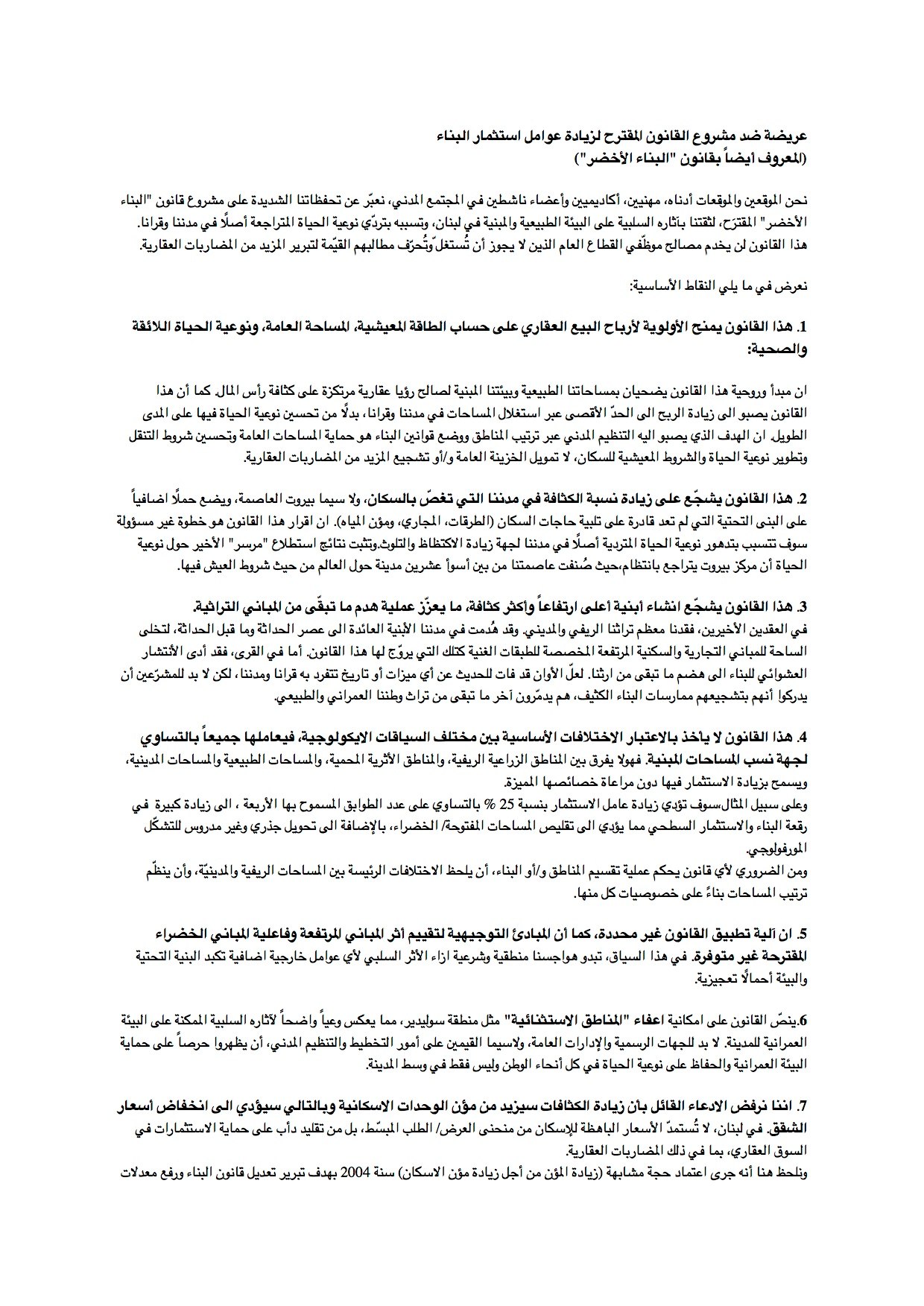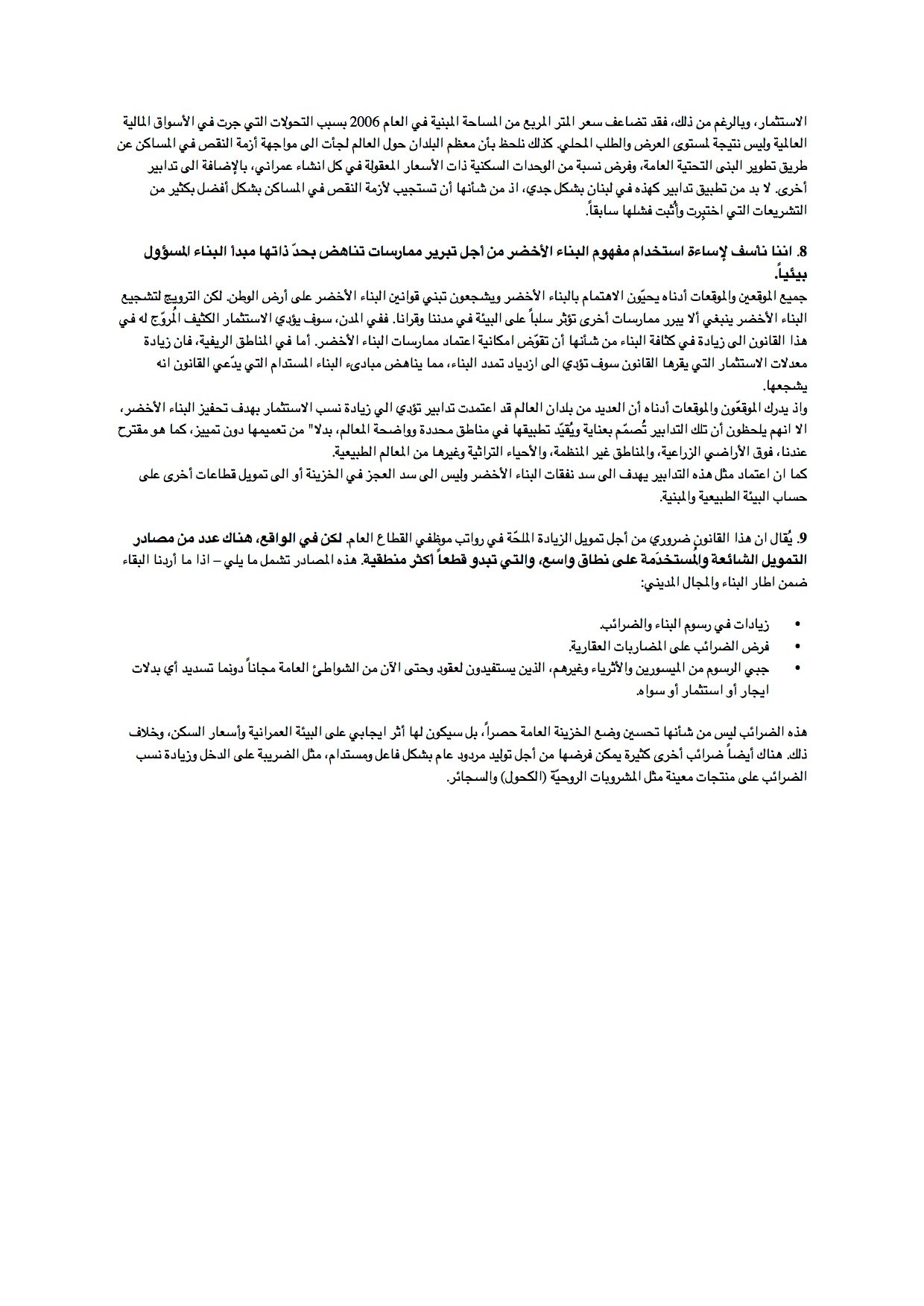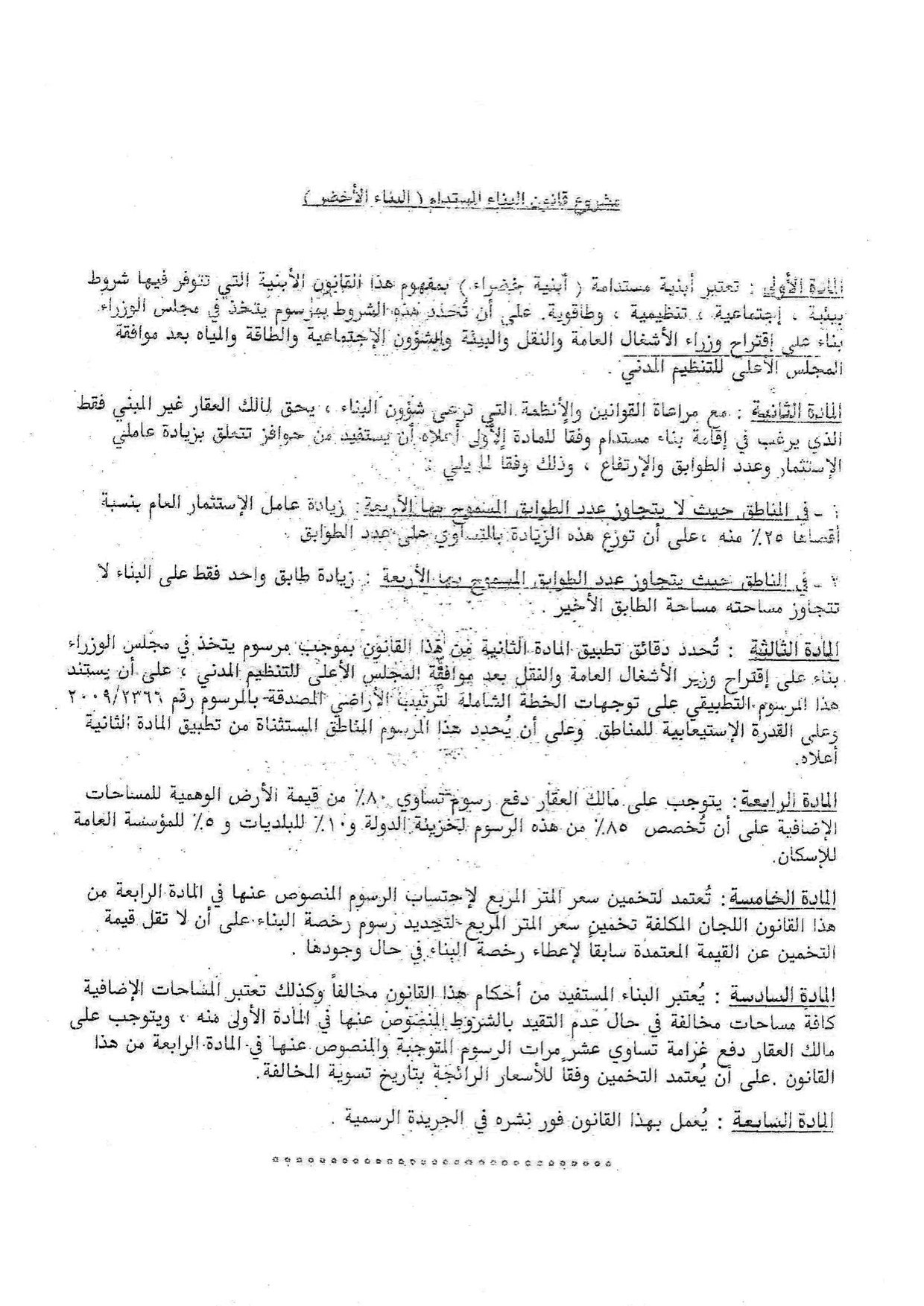For the past six months, the Lebanese government has been stalling in implementing the salary adjustment and wage scale for public employees it had approved in September 2012. The last few weeks have seen an increase in workers’ unions` organized strikes across Lebanese cities demanding the immediate application of the authorized salary increase (see Khaled Saghieh’s article in Jadaliyya for more analysis). The government claims it is still looking into sources of revenue to fund this adjustment. One of the potential sources is an increase in building exploitation factors (i.e., ratios that determine construction surfaces and heights on a lot) through a legal proposal, nicknamed the “Miqati floor,” (after the current Prime Minister) and that has been under discussion for several months with very little information being communicated to the public.
Recently, a group of urban planning professionals, academics, and activists received a copy of the proposed draft law, called the “Sustainable Building” or “Green Building” law. The draft law declares that additional surface areas can be constructed in buildings throughout Lebanon as long as they abide by sustainability criteria that will be later defined by a decree. These constructions are permitted as follows:
- in areas where the building code restricts building height to four floors: a twenty-five percent increase in exploitation is allowed, to be distributed equally on each floor.
- in areas where the code allows a building height superior to four floors: one additional floor is allowed, not to exceed the total area of the last floor.
A decree is supposed to specify the implementation mechanisms of this law, in accordance with the Schéma Directeur de l’Aménagement du Territoire Libanais (SDATL) as well as the zones that are exempted from these regulations.
This proposed law will have several serious, negative impacts on Lebanon’s cities, villages, and natural habitats. It privileges real-estate profit at the expense of livability, the public realm, and a decent and healthy quality of life. It encourages higher densities in already saturated cities and villages, and fosters the demolition of the remaining heritage buildings. It fails to consider key differences between the various ecological contexts and treats them equally in terms of built-up ratios. Its implementation mechanism is not identified and the know-how to evaluate the impact and efficiency of the proposed green buildings is not available. In sum, the “green building” concept will be misused to justify practices that will work against the very principle of an ecologically responsible building practice.
In addition, there are other more effective and widely practiced sources of revenue that can be sought to finance the salary adjustment for the workers, such as (to remain within the building and urban realm): increases in building fees and taxation, taxes on real estate speculation, and collecting fees from the illegal occupation of public beaches.
Through teaching, research and/or practice, the initiators of the below petition have been actively seeking to improve the conditions of urban planning and livability in Lebanon. They have thus launched a petition against this draft law, asking the Lebanese prime minister and the government to stop pursuing it as a source of funding for salary adjustment.
This petition has collected more than six hundred signatures since it went online on Wednesday, 7 March. It has been endorsed by leading urban planning professionals, academics, policy advisors, researchers, NGO members, civil society activists, students, and laypeople from all around concerned with the deteriorating quality of the built and natural environment in Lebanon. The petition is also circulating on a number of blogs and websites, and will be published in main Lebanese newspapers soon. They hope it will be supported by at least one thousand signatures. They will submit the petition and the list of signatories to the council of ministers and the prime minister, requesting they stop pursuing this disastrous law proposal.
The full text of the petition in both English and Arabic can be read below.
Please click here to access the petition, and consider signing and sharing the petition with your networks.
Petition Against the Proposed Law for Increasing Building Exploitation Factors (also known as the “Green Building” Law)
We, the undersigned, professionals, academics and active members of civil society, express our strong reservations to the proposed “green building” law which we believe will have negative impacts on the built and natural environment in Lebanon and decrease an already dwindling quality of life in our cities and villages. The law will not serve the interests of the public sector’s employees whose worthy demands should not be used (and deviated) to justify further real estate speculation.
The main points we put forward are:
1. The law privileges real-estate profit at the expense of livability, the public realm, and a decent and healthy quality of life:
The principle and spirit of the law reduce the significance of our landscapes, built environments, and natural ecologies to a capital-intensive real-estate vision in line with previous zoning and building regulations.
The proposed law seeks to maximize profit from the spaces of our cities and villages rather than secure their long-term livability. Zoning and building regulations should be designed to protect the quality of open/shared public spaces, improve circulation conditions, and raise the quality of life –not finance public coffers and/or encourage further real estate speculation.
2. The law encourages higher densities in our already saturated cities, particularly in the Beirut capital, and puts thus an additional load on an already failing infrastructure system (roads, sewers, and water provision). This is irresponsible and will only worsen the already poor quality of life, i.e. increase congestion and pollution in our cities. Beirut has been steadily loosing its place in the quality of life indicators, as evidenced for example in the recent Mercer survey of quality of life where it ranked among the 20 worst cities in the world.
3. The law encourages denser and higher buildings, which fosters the demolition of the remaining heritage buildings.
Over the last two decades, much of our rural and urban heritage has been lost. In cities, demolished buildings of the modern and pre-modern era have been largely erased, often leaving way to multi-storey high-end residential and commercial buildings of the type promoted by the proposed law. In villages, natural patrimonies and historical landscapes are invaded by sprawling buildings, which production will be facilitated by the adoption of the proposed law. It is perhaps too late to speak of any character or history for most of our cities and villages, but it is imperative that regulators realize that by encouraging more intensive building practices, they are destroying the last remnants of a nation’s natural and built heritage.
4. The law fails to consider key differences between the various ecological contexts and treats them equally in terms of their built-up ratios. It does not distinguish key differences between rural agricultural zones, protected heritage areas, natural historical landscapes, and urban areas which are a;; are formulated alike in terms of building allowances (number of floors and percentage building to be allowed).
For example, in regions where buildings are currently limited to four floors, distributing a 25% increase of exploitation equally across all floors will result in significant increases in the ground level density, the reduction of open/green areas, and more generally a radical and unstudied transformation of the morphology.
It is imperative for any zoning and/or building regulation to understand the key differences that exist between rural and urban areas and to regulate the production of space in terms of their respective specificities.
5. The implementation mechanism is not identified and the know-how to evaluate the impact of higher buildings and the efficiency of the proposed green buildings is not available. In this context, our fears of further negative externalities incurred by the infrastructure and the environment seem well founded.
6. The law is said to exempt ‘special zones’ such as the Solidere area. This reflects a clear awareness of its potentially negative effects on the city’s built environment. Public regulators, particularly urban planning and design agencies should show the same keenness in protecting the built environment and preserving the city’s livability everywhere in the country, not only in the city center.
7. We reject the claim that increasing densities will increase the supply of housing units and hence reduce apartment prices. In Lebanon, the prohibitive cost of housing is not derived from a simple supply/demand curve but rather from a tradition of protecting investments in real estate, including real estate speculation.
We note that in 2004, a similar argument (increasing supply to increase the supply of housing) was proposed to justify the high rates of the building construction law that were adopted. In 2006, the price of the m2 of built land doubled anyway, in relation to global financial markets and not to local supply and demand.
We also note that most countries around the world have taken measures to address housing shortages in the form of improved public infrastructure, an imposition of a percentage of affordable housing for every building development, and others. Such measures should be introduced seriously in Lebanon and will indeed respond to the crisis of housing shortage better than regulations that have been tested and failed earlier.
8. We deplore the misuse of green building concept to justify practices that will work against the very principle of an ecologically responsible building practice.
All signatories applaud the interest in green building and encourage green building regulations to be adopted in the country. Promoting green building practices should however not justify other practices that affect negatively the ecologies of our cities and villages. In cities, the intensive exploitation promoted by the proposed law will induce higher densities that undermine the possibility of green building practices. In rural areas, the increase in sprawl promoted by the law’s intention to allow more intensive building practices will also work against the principles of responsible building enshrined in green practices.
The signatories are aware that in a number of national contexts, incentives for green buildings have been given by increasing exploitation ratios. These were however carefully designed and their application is confined to well-defined and limited areas rather than spreading –as in the proposed regulations, over agricultural lands, heritage zones, and other natural sites indiscriminately. The benefits gathered from the implementation of these regulations is furthermore outweighed by the cost of building practices, in other words they are adopted to defray the cost of green building, not to finance public debt or other sectors of public spending.
7. The law is said to be necessary for financing a badly needed salary adjustments for public sector employees. However, other common and widely practiced sources of financing are evidently more justifiable and include–to remain within the building and urban realm:
- Increases in building fees and taxation
- Taxing real estate speculation
- Collecting fees from the well off who have squatted public beaches for free for decades now.
Not only can such taxes improve the state of public coffers but they may also have a positive effect on the building environment, the cost of housing, etc.
There are also numerous other taxes than can be levied which can effectively generate substantive public revenues, such as income tax, and increasing tax rates on products such as alcoholic beverages and cigarettes.
[To sign the petition, click here.]
Arabic Version of Petition


Text of the Draft Law
